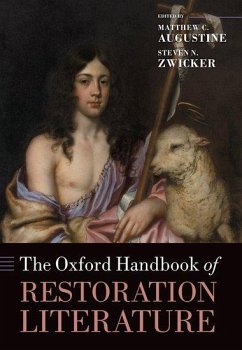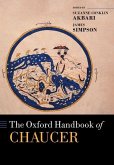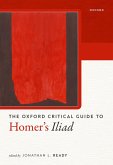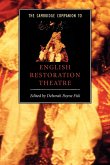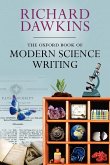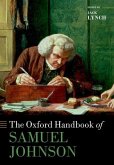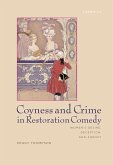The Oxford Handbook of Restoration Literature
Herausgeber: Augustine, Matthew C; Zwicker, Steven N
The Oxford Handbook of Restoration Literature
Herausgeber: Augustine, Matthew C; Zwicker, Steven N
- Gebundenes Buch
- Merkliste
- Auf die Merkliste
- Bewerten Bewerten
- Teilen
- Produkt teilen
- Produkterinnerung
- Produkterinnerung
This books brings new critical perspectives to bear on classic texts, asks challenging new questions about the relations among science, politics, and literary writing, probes emerging genres like the diary and the comedy of manners, and re-reads the great literature of the age.
Andere Kunden interessierten sich auch für
![The Oxford Handbook of British Poetry, 1660-1800 The Oxford Handbook of British Poetry, 1660-1800]() The Oxford Handbook of British Poetry, 1660-1800202,99 €
The Oxford Handbook of British Poetry, 1660-1800202,99 €![The Oxford Handbook of Chaucer The Oxford Handbook of Chaucer]() The Oxford Handbook of Chaucer226,99 €
The Oxford Handbook of Chaucer226,99 €![The Oxford Critical Guide to Homer's Iliad The Oxford Critical Guide to Homer's Iliad]() Jonathan L ReadyThe Oxford Critical Guide to Homer's Iliad167,99 €
Jonathan L ReadyThe Oxford Critical Guide to Homer's Iliad167,99 €![The Cambridge Companion to English Restoration Theatre The Cambridge Companion to English Restoration Theatre]() Deborah Payne FiskThe Cambridge Companion to English Restoration Theatre47,99 €
Deborah Payne FiskThe Cambridge Companion to English Restoration Theatre47,99 €![The Oxford Book of Modern Science Writing The Oxford Book of Modern Science Writing]() Richard DawkinsThe Oxford Book of Modern Science Writing24,99 €
Richard DawkinsThe Oxford Book of Modern Science Writing24,99 €![The Oxford Handbook of Samuel Johnson The Oxford Handbook of Samuel Johnson]() The Oxford Handbook of Samuel Johnson226,99 €
The Oxford Handbook of Samuel Johnson226,99 €![Coyness and Crime in Restoration Comedy Coyness and Crime in Restoration Comedy]() Peggy ThompsonCoyness and Crime in Restoration Comedy122,99 €
Peggy ThompsonCoyness and Crime in Restoration Comedy122,99 €-
-
-
This books brings new critical perspectives to bear on classic texts, asks challenging new questions about the relations among science, politics, and literary writing, probes emerging genres like the diary and the comedy of manners, and re-reads the great literature of the age.
Hinweis: Dieser Artikel kann nur an eine deutsche Lieferadresse ausgeliefert werden.
Hinweis: Dieser Artikel kann nur an eine deutsche Lieferadresse ausgeliefert werden.
Produktdetails
- Produktdetails
- Verlag: Oxford University Press
- Seitenzahl: 800
- Erscheinungstermin: 2. April 2025
- Englisch
- Abmessung: 248mm x 178mm x 50mm
- Gewicht: 1578g
- ISBN-13: 9780192866035
- ISBN-10: 0192866036
- Artikelnr.: 71262499
- Herstellerkennzeichnung
- Libri GmbH
- Europaallee 1
- 36244 Bad Hersfeld
- gpsr@libri.de
- Verlag: Oxford University Press
- Seitenzahl: 800
- Erscheinungstermin: 2. April 2025
- Englisch
- Abmessung: 248mm x 178mm x 50mm
- Gewicht: 1578g
- ISBN-13: 9780192866035
- ISBN-10: 0192866036
- Artikelnr.: 71262499
- Herstellerkennzeichnung
- Libri GmbH
- Europaallee 1
- 36244 Bad Hersfeld
- gpsr@libri.de
As an undergraduate, Matthew C Augustine studied English, Rhetoric, and French at the University of Illinois and then went on to graduate study at Washington University in St Louis, where he became interested in the literary and political cultures of seventeenth-century England. Much of his work has been devoted to deforming the distinctions, boundaries, and oppositions that have traditionally governed our understanding of this period and of its cultural regimes. The poet and politician Andrew Marvell has for several years been a central focus, but he has also written and collaborated widely in studying seventeenth-century literature and literary culture. Steven N. Zwicker was born in San Diego, California, and grew up in Los Angeles. Since his undergraduate days at UCLA, he has been interested in early modern literature, especially the literature of the civil war years and Restoration. Hisgraduate work was directed by Barbara Lewalski at Brown University and when he began teaching at Washington University in St Louis the late historian John Pocock taught the history of political thought at the university. Pocock's work and teaching opened for Zwicker a new way to understand relations between politics and literary culture, and he has worked along that axis for a number of years, writing and teaching about Marvell, Milton, Rochester, and Dryden, and, more broadly, Restoration culture and politics.
* Acknowledgements
* List of Figures
* Names and Dates
* Abbreviations and Conventions
* Contributors
* PART I INTRODUCTION
* 1: Matthew C. Augustine and Steven N. Zwicker: Writing the Stuart
Restoration: Political Time, Cultural Time, and Literary Periodicity
* PART II FASHIONING THE RESTORATION
* 2: David F. Taylor: The Theatre of Politics and the Politics of
Theatre
* 3: David Alff: Restoration Panegyric
* 4: Edward Holberton: Acts of Indemnity and Oblivion: 'This Excellent
Art of Forgetfulness'
* 5: Phil Connell: Remembering the Civil Wars
* 6: Kate Bennett: Restoration Life Writing and the Arts of Assembly
* 7: Michael Mascuch: C. 22-23 April 1661, andc: or, The Diary Method
of Restoration Sovereignty
* PART III THE INSTITUTIONS OF LITERARY CULTURE
* 8: Robert D. Hume: Plays and Players, Playhouses and Playgoers
* 9: Julia Fawcett: Celebrity and the Restoration Actress
* 10: Richard McCabe: Patronage
* 11: John Barnard: Censorship and the Regulation of the Press:
1660-1695
* 12: Margaret J. M. Ezell: Authorship and the Book Trade
* 13: Martin Dzelzainis: Scribal Culture and Literary Sociability:
Marvell and Etherege in Manuscript
* 14: Michael Gavin: Literary Criticism of the Restoration
* PART IV WRITERS AT THE CENTRE
* 15: Gillian Wright: 'For the Bays Designed': Waller, Cowley, Philips
* 16: Tom Lockwood: Dryden and Congreve (and Milton and Jonson)
* 17: James Loxley: Cleveland's Ghosts: Butler, Marvell, and
Restoration Satire
* 18: Erin Murphy: Imagining It Was Otherwise: Cavendish and Milton
* 19: Katherine Mannheimer: 'Voice Made up of Harmony': Rochester and
Behn
* 20: David Roberts: True Comedy? Etherege, Wycherley, Shadwell
* 21: David Parry: Grace Abounding: Baxter and Bunyan
* 22: Blair Hoxby: The Experimental Theatre of Lee and Otway
* 23: Nigel Smith: The Power of Letters: John Locke and Lady Damaris
Masham
* PART V BODIES POLITIC
* 24: Niall Allsopp: The Body Politic in the Literary Imagination
* 25: Thomas A. King: From the Body Politic to Biopolitics
* 26: Laura J. Rosenthal: Scandalous Bodies in the Restoration
* PART VI RESTORATION SPIRITUALITIES
* 27: Elizabeth Sauer: Negotiating Nonconformity: Arts and
Animadversions
* 28: Tessie Prakas: Women, Prayer, and Prophecy
* 29: Alison Shell: Catholic Writing in the Restoration: Mission,
Tradition, Opposition
* PART VII PHILOSOPHY AND NATURAL SCIENCE
* 30: Mordechai Feingold: The Royal Society and Literate Culture
* 31: Helen Thompson: Restoration Science and Literary Representation
in a Global Context
* 32: Claire Preston: 'Affections of Matter': Empirical Description in
Early Modern Natural Philosophy
* PART VIII BORDER-CROSSINGS
* 33: Henry Power: Traffic with the Ancients
* 34: Robert Phiddian: Restoration Parody and Plagiarism
* 35: Lines Cottegnies: Imitation and Admiration, Fear and Loathing:
France in the English Imagination
* 36: Rajani Sudan: Stuart Britannia and the Worlding of Empire
* PART IX ''TIS WELL AN OLD AGE IS OUT': RESTORATION ENDINGS
* 37: Christopher D'Addario: Affect and Uncertainty: Writing the
Glorious Revolution
* 38: Paul K. Monod: Jacobite Literatures
* 39: Paul Davis: When Did the Restoration End?
* List of Figures
* Names and Dates
* Abbreviations and Conventions
* Contributors
* PART I INTRODUCTION
* 1: Matthew C. Augustine and Steven N. Zwicker: Writing the Stuart
Restoration: Political Time, Cultural Time, and Literary Periodicity
* PART II FASHIONING THE RESTORATION
* 2: David F. Taylor: The Theatre of Politics and the Politics of
Theatre
* 3: David Alff: Restoration Panegyric
* 4: Edward Holberton: Acts of Indemnity and Oblivion: 'This Excellent
Art of Forgetfulness'
* 5: Phil Connell: Remembering the Civil Wars
* 6: Kate Bennett: Restoration Life Writing and the Arts of Assembly
* 7: Michael Mascuch: C. 22-23 April 1661, andc: or, The Diary Method
of Restoration Sovereignty
* PART III THE INSTITUTIONS OF LITERARY CULTURE
* 8: Robert D. Hume: Plays and Players, Playhouses and Playgoers
* 9: Julia Fawcett: Celebrity and the Restoration Actress
* 10: Richard McCabe: Patronage
* 11: John Barnard: Censorship and the Regulation of the Press:
1660-1695
* 12: Margaret J. M. Ezell: Authorship and the Book Trade
* 13: Martin Dzelzainis: Scribal Culture and Literary Sociability:
Marvell and Etherege in Manuscript
* 14: Michael Gavin: Literary Criticism of the Restoration
* PART IV WRITERS AT THE CENTRE
* 15: Gillian Wright: 'For the Bays Designed': Waller, Cowley, Philips
* 16: Tom Lockwood: Dryden and Congreve (and Milton and Jonson)
* 17: James Loxley: Cleveland's Ghosts: Butler, Marvell, and
Restoration Satire
* 18: Erin Murphy: Imagining It Was Otherwise: Cavendish and Milton
* 19: Katherine Mannheimer: 'Voice Made up of Harmony': Rochester and
Behn
* 20: David Roberts: True Comedy? Etherege, Wycherley, Shadwell
* 21: David Parry: Grace Abounding: Baxter and Bunyan
* 22: Blair Hoxby: The Experimental Theatre of Lee and Otway
* 23: Nigel Smith: The Power of Letters: John Locke and Lady Damaris
Masham
* PART V BODIES POLITIC
* 24: Niall Allsopp: The Body Politic in the Literary Imagination
* 25: Thomas A. King: From the Body Politic to Biopolitics
* 26: Laura J. Rosenthal: Scandalous Bodies in the Restoration
* PART VI RESTORATION SPIRITUALITIES
* 27: Elizabeth Sauer: Negotiating Nonconformity: Arts and
Animadversions
* 28: Tessie Prakas: Women, Prayer, and Prophecy
* 29: Alison Shell: Catholic Writing in the Restoration: Mission,
Tradition, Opposition
* PART VII PHILOSOPHY AND NATURAL SCIENCE
* 30: Mordechai Feingold: The Royal Society and Literate Culture
* 31: Helen Thompson: Restoration Science and Literary Representation
in a Global Context
* 32: Claire Preston: 'Affections of Matter': Empirical Description in
Early Modern Natural Philosophy
* PART VIII BORDER-CROSSINGS
* 33: Henry Power: Traffic with the Ancients
* 34: Robert Phiddian: Restoration Parody and Plagiarism
* 35: Lines Cottegnies: Imitation and Admiration, Fear and Loathing:
France in the English Imagination
* 36: Rajani Sudan: Stuart Britannia and the Worlding of Empire
* PART IX ''TIS WELL AN OLD AGE IS OUT': RESTORATION ENDINGS
* 37: Christopher D'Addario: Affect and Uncertainty: Writing the
Glorious Revolution
* 38: Paul K. Monod: Jacobite Literatures
* 39: Paul Davis: When Did the Restoration End?
* Acknowledgements
* List of Figures
* Names and Dates
* Abbreviations and Conventions
* Contributors
* PART I INTRODUCTION
* 1: Matthew C. Augustine and Steven N. Zwicker: Writing the Stuart
Restoration: Political Time, Cultural Time, and Literary Periodicity
* PART II FASHIONING THE RESTORATION
* 2: David F. Taylor: The Theatre of Politics and the Politics of
Theatre
* 3: David Alff: Restoration Panegyric
* 4: Edward Holberton: Acts of Indemnity and Oblivion: 'This Excellent
Art of Forgetfulness'
* 5: Phil Connell: Remembering the Civil Wars
* 6: Kate Bennett: Restoration Life Writing and the Arts of Assembly
* 7: Michael Mascuch: C. 22-23 April 1661, andc: or, The Diary Method
of Restoration Sovereignty
* PART III THE INSTITUTIONS OF LITERARY CULTURE
* 8: Robert D. Hume: Plays and Players, Playhouses and Playgoers
* 9: Julia Fawcett: Celebrity and the Restoration Actress
* 10: Richard McCabe: Patronage
* 11: John Barnard: Censorship and the Regulation of the Press:
1660-1695
* 12: Margaret J. M. Ezell: Authorship and the Book Trade
* 13: Martin Dzelzainis: Scribal Culture and Literary Sociability:
Marvell and Etherege in Manuscript
* 14: Michael Gavin: Literary Criticism of the Restoration
* PART IV WRITERS AT THE CENTRE
* 15: Gillian Wright: 'For the Bays Designed': Waller, Cowley, Philips
* 16: Tom Lockwood: Dryden and Congreve (and Milton and Jonson)
* 17: James Loxley: Cleveland's Ghosts: Butler, Marvell, and
Restoration Satire
* 18: Erin Murphy: Imagining It Was Otherwise: Cavendish and Milton
* 19: Katherine Mannheimer: 'Voice Made up of Harmony': Rochester and
Behn
* 20: David Roberts: True Comedy? Etherege, Wycherley, Shadwell
* 21: David Parry: Grace Abounding: Baxter and Bunyan
* 22: Blair Hoxby: The Experimental Theatre of Lee and Otway
* 23: Nigel Smith: The Power of Letters: John Locke and Lady Damaris
Masham
* PART V BODIES POLITIC
* 24: Niall Allsopp: The Body Politic in the Literary Imagination
* 25: Thomas A. King: From the Body Politic to Biopolitics
* 26: Laura J. Rosenthal: Scandalous Bodies in the Restoration
* PART VI RESTORATION SPIRITUALITIES
* 27: Elizabeth Sauer: Negotiating Nonconformity: Arts and
Animadversions
* 28: Tessie Prakas: Women, Prayer, and Prophecy
* 29: Alison Shell: Catholic Writing in the Restoration: Mission,
Tradition, Opposition
* PART VII PHILOSOPHY AND NATURAL SCIENCE
* 30: Mordechai Feingold: The Royal Society and Literate Culture
* 31: Helen Thompson: Restoration Science and Literary Representation
in a Global Context
* 32: Claire Preston: 'Affections of Matter': Empirical Description in
Early Modern Natural Philosophy
* PART VIII BORDER-CROSSINGS
* 33: Henry Power: Traffic with the Ancients
* 34: Robert Phiddian: Restoration Parody and Plagiarism
* 35: Lines Cottegnies: Imitation and Admiration, Fear and Loathing:
France in the English Imagination
* 36: Rajani Sudan: Stuart Britannia and the Worlding of Empire
* PART IX ''TIS WELL AN OLD AGE IS OUT': RESTORATION ENDINGS
* 37: Christopher D'Addario: Affect and Uncertainty: Writing the
Glorious Revolution
* 38: Paul K. Monod: Jacobite Literatures
* 39: Paul Davis: When Did the Restoration End?
* List of Figures
* Names and Dates
* Abbreviations and Conventions
* Contributors
* PART I INTRODUCTION
* 1: Matthew C. Augustine and Steven N. Zwicker: Writing the Stuart
Restoration: Political Time, Cultural Time, and Literary Periodicity
* PART II FASHIONING THE RESTORATION
* 2: David F. Taylor: The Theatre of Politics and the Politics of
Theatre
* 3: David Alff: Restoration Panegyric
* 4: Edward Holberton: Acts of Indemnity and Oblivion: 'This Excellent
Art of Forgetfulness'
* 5: Phil Connell: Remembering the Civil Wars
* 6: Kate Bennett: Restoration Life Writing and the Arts of Assembly
* 7: Michael Mascuch: C. 22-23 April 1661, andc: or, The Diary Method
of Restoration Sovereignty
* PART III THE INSTITUTIONS OF LITERARY CULTURE
* 8: Robert D. Hume: Plays and Players, Playhouses and Playgoers
* 9: Julia Fawcett: Celebrity and the Restoration Actress
* 10: Richard McCabe: Patronage
* 11: John Barnard: Censorship and the Regulation of the Press:
1660-1695
* 12: Margaret J. M. Ezell: Authorship and the Book Trade
* 13: Martin Dzelzainis: Scribal Culture and Literary Sociability:
Marvell and Etherege in Manuscript
* 14: Michael Gavin: Literary Criticism of the Restoration
* PART IV WRITERS AT THE CENTRE
* 15: Gillian Wright: 'For the Bays Designed': Waller, Cowley, Philips
* 16: Tom Lockwood: Dryden and Congreve (and Milton and Jonson)
* 17: James Loxley: Cleveland's Ghosts: Butler, Marvell, and
Restoration Satire
* 18: Erin Murphy: Imagining It Was Otherwise: Cavendish and Milton
* 19: Katherine Mannheimer: 'Voice Made up of Harmony': Rochester and
Behn
* 20: David Roberts: True Comedy? Etherege, Wycherley, Shadwell
* 21: David Parry: Grace Abounding: Baxter and Bunyan
* 22: Blair Hoxby: The Experimental Theatre of Lee and Otway
* 23: Nigel Smith: The Power of Letters: John Locke and Lady Damaris
Masham
* PART V BODIES POLITIC
* 24: Niall Allsopp: The Body Politic in the Literary Imagination
* 25: Thomas A. King: From the Body Politic to Biopolitics
* 26: Laura J. Rosenthal: Scandalous Bodies in the Restoration
* PART VI RESTORATION SPIRITUALITIES
* 27: Elizabeth Sauer: Negotiating Nonconformity: Arts and
Animadversions
* 28: Tessie Prakas: Women, Prayer, and Prophecy
* 29: Alison Shell: Catholic Writing in the Restoration: Mission,
Tradition, Opposition
* PART VII PHILOSOPHY AND NATURAL SCIENCE
* 30: Mordechai Feingold: The Royal Society and Literate Culture
* 31: Helen Thompson: Restoration Science and Literary Representation
in a Global Context
* 32: Claire Preston: 'Affections of Matter': Empirical Description in
Early Modern Natural Philosophy
* PART VIII BORDER-CROSSINGS
* 33: Henry Power: Traffic with the Ancients
* 34: Robert Phiddian: Restoration Parody and Plagiarism
* 35: Lines Cottegnies: Imitation and Admiration, Fear and Loathing:
France in the English Imagination
* 36: Rajani Sudan: Stuart Britannia and the Worlding of Empire
* PART IX ''TIS WELL AN OLD AGE IS OUT': RESTORATION ENDINGS
* 37: Christopher D'Addario: Affect and Uncertainty: Writing the
Glorious Revolution
* 38: Paul K. Monod: Jacobite Literatures
* 39: Paul Davis: When Did the Restoration End?

